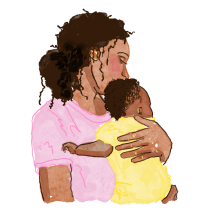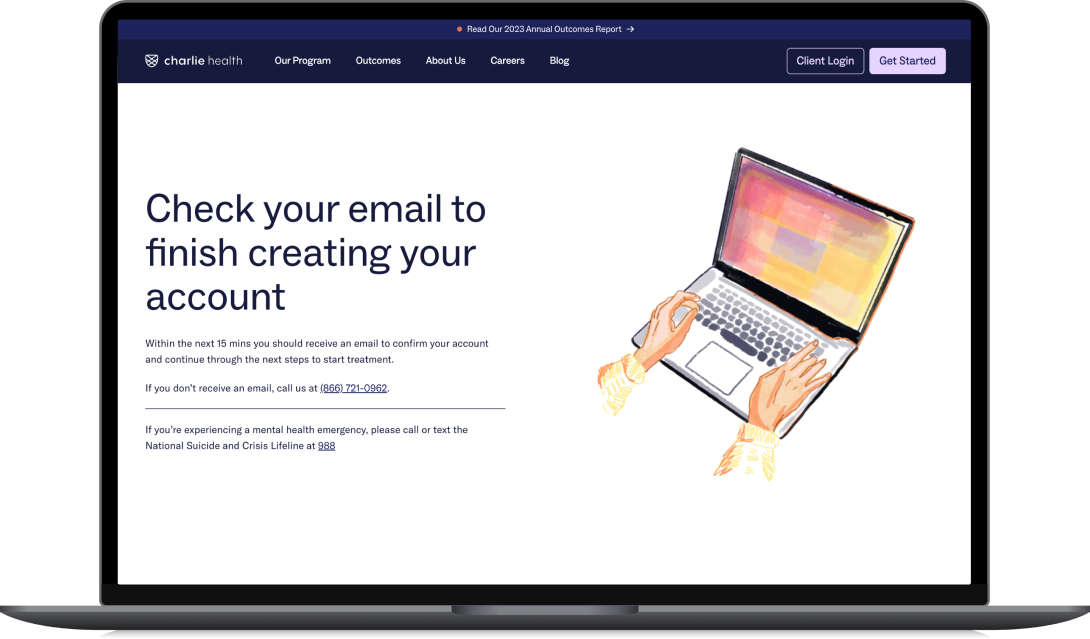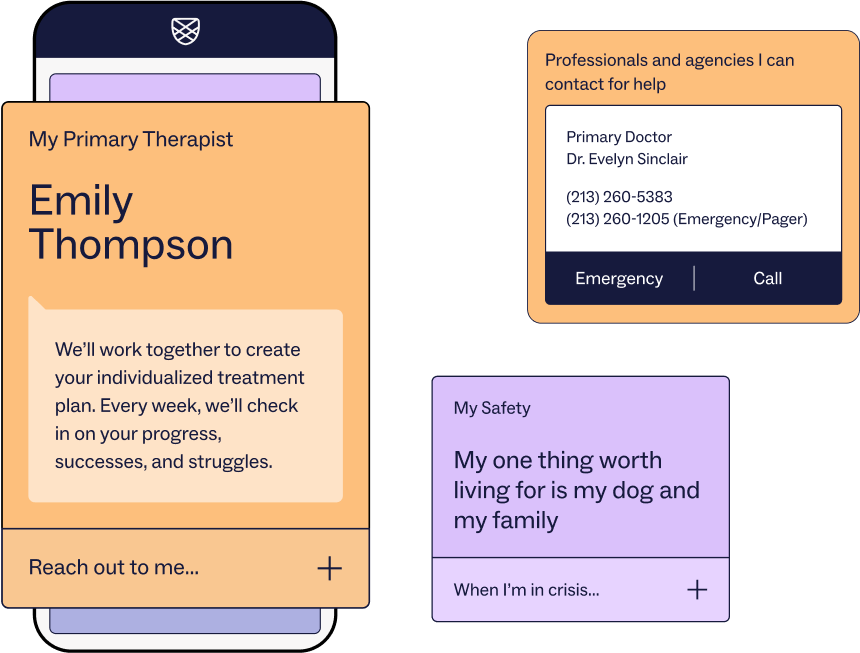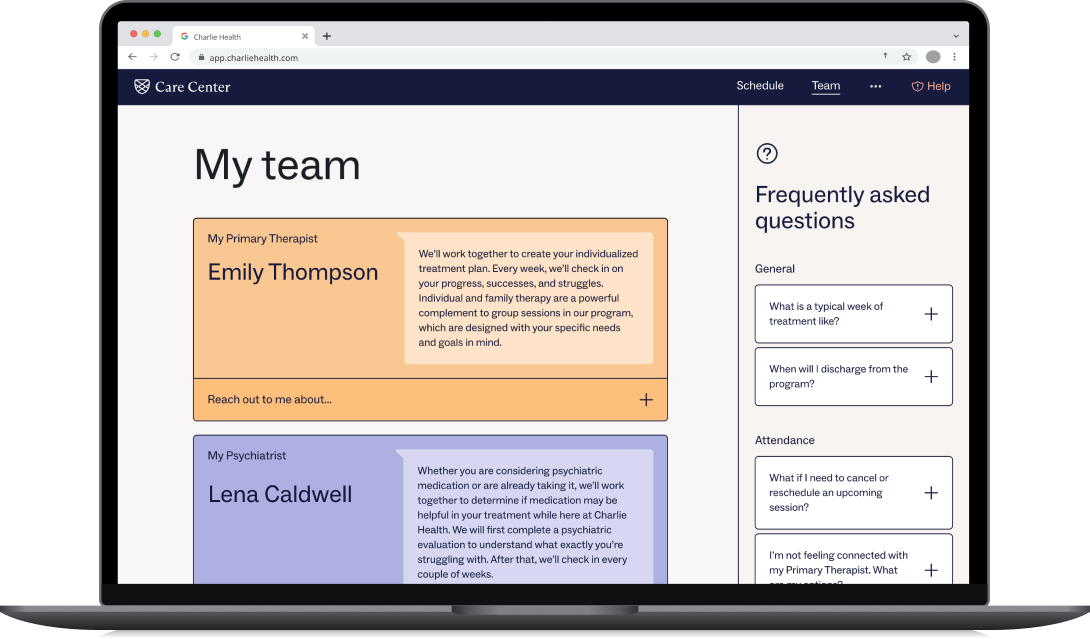Virtual therapy for maternal mental health at Charlie Health
What is virtual IOP for maternal mental health?
Curated groups
By bringing new parents with similar mental health challenges together, we’re able to create group environments where people can learn how to build connections and foster long-term healing.
Individual therapy
One-on-one connections are critical to the IOP model, which is why each new parent’s unique treatment plan includes a primary therapist who specializes in perinatal mood & anxiety disorders and postpartum depression for weekly individual sessions.
Family therapy
A leading predictor of success in treatment is family involvement. Our virtual IOP’s family therapy component teaches communication and coping skills to manage family relationship issues and create a more supportive home environment both during and after treatment.
We also offer dozens of free family support groups for family members and loved ones of clients enrolled in our program. Learn more here.
Our unique approach to maternal mental healthcare

Immediate availability
In-network with insurance
Virtual access
Group sessions with other new moms & parents
Flexible scheduling, including nights & weekends
We proudly partner with many major insurance providers, including commercial, Medicaid, and TRICARE
We specialize in treating perinatal and postpartum mental health conditions with hyper-personalized, comprehensive care

 Reach out
Reach out
Call our Admissions Team 24/7 or fill out our quick form to learn more about our program and verify your insurance coverage
 Get matched
Get matched
We’ll conduct a thorough assessment to create your personalized virtual treatment plan


 Get matched
Get matched
We’ll conduct a thorough assessment to create your personalized virtual treatment plan

 Start healing
Start healing
Meet your group and your primary therapist in as little as 24 hours
93% of clients in our maternal mental health program reported improvements in their depression
In their words
What our clients say
“I didn’t get help with postpartum depression until Charlie Health.”
After my daughter was born, I knew that something wasn’t right with my mental health, but because I live in a rural area where you have to wait six or seven months to see a provider, I didn’t get help with postpartum depression until Charlie Health. I always used to feel like I wasn’t good enough as a parent, but now I know that I’m trying to be the best mom I can be. Charlie Health taught me how to regulate my emotions and put things in perspective, which has made it easier to help my daughter manage her own emotions.
After my daughter was born, I knew that something wasn’t right with my mental health, but because I live in a rural area where you have to wait six or seven months to see a provider, I didn’t get help with postpartum depression until Charlie Health. I always used to feel like I wasn’t good enough as a parent, but now I know that I’m trying to be the best mom I can be. Charlie Health taught me how to regulate my emotions and put things in perspective, which has made it easier to help my daughter manage her own emotions.
—Dejah J.
“I’ve found a part of myself again, a spark of joy I haven’t seen in myself in years.”
When I started with Charlie Health, I was in a really dark place. I was actively re-experiencing my trauma through flashbacks and deeply depressed. Charlie Health helped me realize what was happening, how to handle those flashbacks in the moment and the future, and also helped me learn what it means to be worthy. I feel like I’ve found a part of myself again, a spark of joy I haven’t seen in myself in years. I’ve learned a lot of skills that I know will be in my toolbox for a long time. The bonds that I’ve made with my group and even the group facilitators has been so healing and validating.
When I started with Charlie Health, I was in a really dark place. I was actively re-experiencing my trauma through flashbacks and deeply depressed. Charlie Health helped me realize what was happening, how to handle those flashbacks in the moment and the future, and also helped me learn what it means to be worthy. I feel like I’ve found a part of myself again, a spark of joy I haven’t seen in myself in years. I’ve learned a lot of skills that I know will be in my toolbox for a long time. The bonds that I’ve made with my group and even the group facilitators has been so healing and validating.
—Hannah O.
“I didn’t think I’d be able to find help.”
Charlie Health has helped me regulate my negative emotions and discover what kinds of emotions I’m feeling in the moment, and figure out my boundaries. This was very much needed since emotions were my top issue to figure out alongside trauma. I have learned to not only accept my traumatic experiences, but come out as a survivor with people that understand what I went through. Charlie Health group therapy has helped me, and before group therapy, I didn’t think I’d be able to find help. Thank you Charlie Health!!
Charlie Health has helped me regulate my negative emotions and discover what kinds of emotions I’m feeling in the moment, and figure out my boundaries. This was very much needed since emotions were my top issue to figure out alongside trauma. I have learned to not only accept my traumatic experiences, but come out as a survivor with people that understand what I went through. Charlie Health group therapy has helped me, and before group therapy, I didn’t think I’d be able to find help. Thank you Charlie Health!!
—Bridget L.
FAQs about our maternal mental health program
See All FAQsHow does virtual IOP work for new parents at Charlie Health?
Charlie Health’s virtual Intensive Outpatient Program (IOP) is a personalized treatment solution for new parents with serious mental health conditions, including perinatal mood and anxiety disorders and other conditions that arise with new parenthood. Each treatment plan consists of up to 9-12 hours per week of:
- Curated groups
- Individual therapy
- Family therapy
- Psychiatry, as needed
In addition to our standard treatment model, all new parents have access to 24/7 crisis care, 20+ free family support groups, mentors, Alumni Programming, and more.
We design each treatment plan with one primary goal in mind: helping new parents adjust and rediscover hope. If you or a person in your life could benefit from Charlie Health, please contact our Admissions Team to get started in as little as 24 hours.
What are the benefits of a virtual IOP for new parents?
1) They can treat multiple conditions.
Virtual IOP for new parents can effectively address a variety of mental health concerns and co-occurring conditions. These are situations where people experience two or more mental health conditions at the same time.
At Charlie Health, we specialize in treating:
- Anxiety disorders
- Attention-deficit/hyperactivity disorder (ADHD)
- Depression
- Dissociative disorders
- Gender dysphoria
- Mood disorders (bipolar disorder, etc.)
- Neurodivergence
- Obsessive-compulsive disorder (OCD)
- Perinatal mood and anxiety disorders
- Personality disorders
- Postpartum depression
- Substance use disorders (co-occurring)
- Suicidal ideation & self-harm
- Trauma & related conditions (PTSD, etc.)
- Traumatic brain injuries
- And more
2) They use a variety of treatment modalities.
Virtual IOP uses a variety of treatment modalities in group, individual, and family sessions, ensuring that new parents receive the best evidence-based care available. At Charlie Health, we offer:
- Attachment-based family therapy
- Cognitive behavioral therapy (CBT)
- Compassion-focused therapy (CFT)
- Dialectical behavior therapy (DBT) skills
- Experiential therapy
- Exposure therapy
- Mindfulness-based therapy
- Motivational interviewing
- And more
3) The power of group connection.
Traditional weekly therapy is typically conducted one-on-one. The basis of virtual IOP, however, is group sessions, allowing new parents to heal together, build connections with others who understand what they’re going through, and practice skills in real time. Centering treatment in group support means clients can learn not only from the therapist but also from the experiences and insights shared by their fellow group members, fostering a sense of belonging and validation.
4) Flexible and accessible.
Virtual IOP allows new parents to continue with daily life, like work or childcare responsibilities. With flexible scheduling, including options at night and on the weekend, people don’t have to put life on pause to get the mental health treatment they need.
How do I know if Charlie Health’s virtual IOP is right for me or my loved one?
Our primary treatment offering – virtual Intensive Outpatient Programming (IOP) – is an appropriate level of care for people who need more than once-weekly therapy, including new parents struggling with serious mental health conditions. Many of our clients have either recently discharged from a higher level of care (e.g., residential, inpatient, emergency room) or are seeking more support than traditional weekly talk therapy (outpatient).
While typical outpatient treatment involves one therapy session per week, our virtual IOP offers multiple hours of treatment per week. At Charlie Health, each client receives a customized treatment plan that includes three group sessions per week with other new parents, one individual therapy session per week, and one family therapy session per week. We also offer psychiatric services as needed.
Different therapy modalities are used throughout sessions, creating a truly comprehensive treatment program.
Does Charlie Health accept insurance?
Yes — Charlie Health’s virtual IOP is in-network with most major insurance providers including commercial plans and Medicaid (in states where IOP is covered). Please contact our Admissions Team to learn more about your plan’s specific coverage, or check out our Insurance page.
How do I sign up?
Fill out our quick online form or reach out to our Admissions Team directly at 1 (866) 671-5457 and get started with our virtual IOP for maternal mental health in as little as 24 hours.
The core mental health conditions we treat
*Analysis of depression outcomes based on self-reported data from routinely discharged clients in our maternal mental health program who had moderately severe or severe depression at intake, and improvements at discharge.
